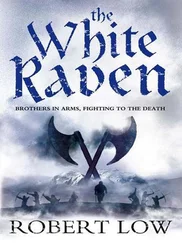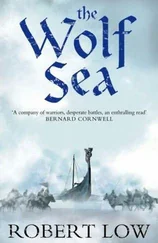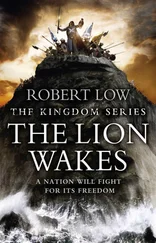`Nothing will now keep me from that burial place,' she declared. 'But I will need something from you.'
We moved to Kiev not long afterwards, in a mad, shouting, frantic chaos of boats and men, leaving Valgard and a dozen Oath-sworn with the Elk.
Novgorod was as far as foreign ships went. All the traders were forced to the Rus boats: the strugi and the larger nasady, which were expensive, but could withstand Baltic storms and the grind of dragging them over portages. It was as sound a way as any of making sure the Prince of Kiev controlled the river trade.
But the traders stayed in the crowded anchorage this time, fuming and cursing, because every boat had been taken by Sviatoslav to move men and gear swiftly down to Kiev the Golden. From there, we'd move across to the Don and down it to face the Khazars.
I remember the journey as one of the laziest I have ever had. The only lazier one was the sail down the Don afterwards.
As part of Yaropolk's druzhina we had nothing to do. Local rivermen poled the boats and all we did was clean our gear, admire each other in our new cloaks—the colour of old blood and the mark of our druzhina status—and speculate on whether the women in Kiev would be better than those in Novgorod.
They were. Everything about Kiev was better and it roared with life, swollen by people from everywhere.
Entire tribes had arrived: Merians, Polianians, Severians, Derevlians, Radimichians, Dulebians, and Tivercians and names even seasoned traders had barely heard of.
They came with horses and dogs and women and children, bringing an incredible babble and swirling life to the place, and we strode through them all, brighter threads in this rich tapestry, a head taller than all of them, rich in dress and ornament and swagger.
The city heaved with life and colour, from the cherries drying on the rooftops of the khaty, their timber and clay houses, to the pears and quinces that glistened in the sun on bowing branches.
Down the Zalozny road came caravans from Serkland with spice, gems, satins, Damascus steel and fine horses. Up the Kursk road still came a vital trickle of silver, which the Volga Bulgars traded from mines even further east. From Novgorod, though, which should have been sending wool, linens, tinted glass, herring, beer, salt and even fine bone needles, came nothing but us, gawping and spitting and roaring.
Kiev was starting to swelter in the heat of a summer sun and Illugi Godi grew increasingly morose, even as the Oathsworn hurled themselves delightedly into the whirling welter of it, hunting out drink and women.
Ènjoy it while you can, boy,' he declared, leaning on his staff as I leaped down on to the jetty, joining a dozen others heading into the teeming streets. 'There will be disease and worse if we stay here for long.'
I waved to him, but I didn't care. The spectre of Hild was like a silent, accusing finger these days. She spent most of her time huddled close to Einar, sharing the gods knew what—not love, certainly.
And then there was my father. I had tried to bring up the subject of Gudleif, of the first five years of my life, of my mother, but he had dismissed it all with a wave, as something of no consequence. Yet it was his brother and I wanted to know . . . even today I don't know what I wanted to know.
That it bothered him. That I could help. That we were blood kin right enough.
Instead, it was as if we had shifted three or four oars down from each other. If it kept up this way, we would be on different boats, he and I.
I wanted drink and women that day in Kiev.
I got them, too. Even now, I can remember little of it and even that is probably what I was told by others.
There was a party of Greeks, engineers sent by the Miklagard Emperor. They had been in Kiev for months cutting timber and building huge siege engines in jointed sections for easy transport and they knew the best places to go.
There were women and I remember humping on a table and was told I had taken a wager I could hump the fattest, ugliest one in the place and won, despite Ketil Crow being convinced I could never get aroused enough with the one chosen. But, as Valknut pointed out, the difference between a reasty crone and Thor's golden-haired wife, Sif, is about eight horns of mead.
I had that and more. I had never drunk so much and remembered only being hauled lip out of a pool of my own mead vomit, my hair sticky with it. There was water that left me dripping, but I couldn't feel it. I couldn't feel my lips, or my legs. The memory left me.
Later, I learned that I had been carried back to our Rus riverboat almost in triumph—dropped a few times by the unsteady bearers—and flung on my own fur-lined sleep-bag.
What I do remember—I still jerk awake sometimes in the night remembering—is being kicked and the sound of screams. I saw figures and flames and someone yelled—in my ear, almost, so that my head burst in bright colours of pain: 'Arm yourself, you fuck, we're boarded.'
That staggered me half-upright. I found my sword and fumbled for my shield in the half-light of dawn, bleary-eyed, trying to work out where I was. Keep them next to you, we had been told. Always next to you . .
.
I was on the deck of the Rus boat, which was shadowed with figures who screamed and slashed. Booted feet thundered; blades clashed; shields thumped. I saw Ketil Crow hurl himself like a growling terrier into a pack of men, slashing wildly, then retreat before they recovered enough to hit him back. His mail gleamed redly in the wild torchlight.
I lurched towards him, the half-formed idea of standing on his shieldless side in my head. As I got to him, three men moved forward, half-crouched, wary, but determined. I didn't know any of them, but I knew the threat of a bloody great Dane axe when I saw one.
The blow came and slammed into my shield with a sound like a falling tree and I staggered under it.
Ketil Crow, grunting and panting, was struggling with the other two, being awkward for them because he was left-handed—but the man with the big two-handed axe was mine alone.
Another blow staggered me backwards, then he swiftly reversed and aimed a whack with the butt on my sword-arm, but my own wild flailings bounced it up and it hit the edge of the shield, then the side of my head.
The flare of light and pain was a whole world; nothing else existed. I couldn't see and I heard only a vague screaming. Something monstrous smashed against my shield-arm—then the world hoiked itself back into the Now, where it was me howling, the Dane axe was whirling round again and I was on one knee.
He was good, the axeman. He gave up trying to splinter the shield and thumped the axehead against it, trying to knock it down, then swiftly reversed to try to butt me in the face. Staggering, the drunk fumes burned away in a fire of fear, I managed to fend that off and get to my feet.
As I did, he hooked the blade behind the shield, wrenching it forward to try to break the straps. The butt end stabbed out once more when this, too, failed. It caught me slightly on the chest and even that made me grunt with pain.
He backed off a little, then came in again, snarling and scything the axe low, trying to cut the feet from me. I scampered backwards, collided with someone and battered behind me with the shield, not caring who it was.
He saw an opening, roared the axe back in a half-arc, mouth open in a tow-coloured beard, hair a mass of wild straggles. It slammed into someone to his right and caught. He raged and tore it free and it came whistling round with a flap of cloth attached from someone's cloak—but I avoided it, then struck my first blow, which just missed his forearm.
He leaped back and we paused, heaving for breath. Around us was madness and struggle, but the arc of the Dane axe had cleared a circle round the pair of us, as if by some spell.
Читать дальше
Конец ознакомительного отрывка
Купить книгу











